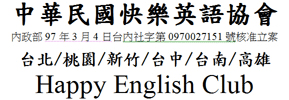網站 http://www.happyforum.org/ 歡迎超連結並轉寄網址
論壇 http://www.happyforum.org/happy/ 歡迎至論壇討論
第128次例會,2007年10月27日(週六)下午2:30~5:30
Place:
viewtopic.php?t=15
Time:
14:30 ~15:30 (Free Talks)
15:30~16:00(Speaker Session)
16:00~17:15 (Topic Discussion)
17:15~17:30 (Happy Time)
Host: Amy Kao
Assistant Host:
Topic: How you can be Green - Part II
Source: Global Voice high-intermediate and advanced August 2007
With terms like global warming, urban sprawl, acid rain and the Asian Brown Cloud frequently appearing in the news, it’s hard to be optimistic about the environment. In his weekly World View column, Newsweek editor Fareed Zakaria stated in the April 16 issue that during the Kyoto Accord’s timeframe of until 2012, China and India alone will add almost 800 new coal-fired power gases from them, he wrote, will be five times the total carbon reductions mandated by Kyoto.
The situation, however, isn’t hopeless. Revolutionary green homes and skyscrapers that recycle water and run on solar energy have already been designed. Hydrogen fuel cell and gas-electric hybrid vehicles are already beginning to replace internal combustion engine cars. Advances in solar plants and wind farms have increased their energy yields. Moreover, it is believed that the world’s petroleum supply will peter out by mid-century, thus forcing us to switch to cleaner alternatives. All that is needed is the political will to make the costly changes.
The following is a list of simple things that you, as an average citizen, can do to protect the environment while governments decide if they’re going to act. The items all come from the Time magazine article “51 Things We Can do” and the World Wildlife Fund publication “How you can help the environment in your daily life.”
At the Market
Here’s a shocker. The U.N. Food and Agriculture Organization just reported that the international meat industry generates 18% of the world’s greenhouse gas emissions, which is even more than transportation. The world’s 6.5 billion people feed on a global herd of 1.5 billion cows and 1.7 billion sheep and goats. The dung from these animals is heavy in methane, which has a global warming effect 23 times greater than carbon. Limiting or eliminating your red meat consumption would also benefit your health and lower your grocery bills.
While shopping, vigilant green consumers bring their own bags, buy recycled paper, organically grown fruits and veggies and biodegradable cleaning products – take the time to read what’s printed on products. Concerning clothes, cotton is preferable to all synthetic materials. In all things, one can also choose products with lighter packaging. Many companies use big packages to try to make it look like they’re giving you more, but you can develop the practice of checking the weight information of what you buy.
On the Road
Transportation accounts for 14 % of global greenhouse gas emissions. Using BRT (bus/rapid transit) services is a great way to reduce your own ecological impact in this area, while walking and cycling are even better. If you rent your home, reducing your daily commute by moving would be greener and save you time and money. Some of all of these suggestions might not be feasible for you, but there are other things you can do.
Car pooling is obvious, and whatever vehicle you drive, keep it maintained properly. An engine tune-up improves gas mileage by an average of 4%, changing old air filters boosts efficiency by 10%, and keeping tires properly inflated will improve mileage by at least 3%.
Another thing you could do is choose driving routes that reduce or eliminate left turns. This does sound weird, but the UPS in America was hailed by environmentalists for eliminating the need to idle its truck engines while waiting to turn against oncoming traffic. For you, this could be as simple as mapping out a different commuting route.
Vocabulary:
Green 環保 Column 專欄 Timeframe 時間範圍 Revolutionary 完全創新的 Emission 排放物 Dung 糞 Vigilant警惕的/留心的 Biodegradable 生物所能分解的 Synthetic 人造的 Commute 通勤 Feasible可用的/合適的 Boost 提高/增加 Efficiency 效率 Hail 喝采/擁立 Idle (機器)空轉
Question:
1. What environmental measures have already been taken in Taiwan? In your opinion, what else should be done?
2. Can you think of any other ways that you can reduce your own “ecological footprint”?
參與例會,請自行列印當週的討論文章並帶至現場,圖示如下:

http://www.happyforum.org/
台北,每週六 (2005年6月起)
Taipei, Saturday, Weekly
from June, 2005
Place:
viewtopic.php?t=15

高雄,每月最後一個週日 (2007年4月起)
Kaohsiung, Final Sunday, Monthly
from April, 2007
Place:
viewtopic.php?t=15

-------------------------------------------------------------------------------------------------------
-------------------------------------------------------------------------------------------------------









